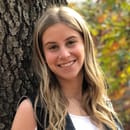In October I attended an music event at the Multicultural Center. Fendika, an Ethiopian music group based in Addis Ababa, the country’s capital, came to perform on campus. The concert was an exquisite snapshot into the vibrant and colorful country of Ethiopia and a beautiful moment in which our diverse community was brought together. The student responsible for bringing Fendika to UCSB is Alexandra Gessesse, a third-year Philosophy and Black Studies major who, in her three years at UCSB, has been involved in countless organizations and efforts to empower marginalized communities on campus. From serving on the Associated Students Senate to founding the East African Student Association, Alexandra has put in tireless hours fighting for communities of color, sexual assault survivors, and more, and she isn’t stopping any time soon.
I sat down with Alexandra to talk about her work on campus, what keeps her motivated, and how she is navigating this current political climate in which she feels her community is under attack.
Tell me a little about yourself. Where are you from, how did you get into the work you do and what are you currently involved in on campus?
I am from a small town called Apple Valley, a desert community in between Vegas and Riverside. I grew up in an Ethiopian-Greek household, my mom is half Greek and half Ethiopian and my dad is full Ethiopian so I had a strong pull of African traditions at home with a mix of American pop culture outside of the house so I always kind of balanced two identities. Community service is a huge part of the Ethiopian culture so growing up I was feeding the homeless with my dad and every Christmas we would give out care packages at a center for battered women, at the homeless shelter, and at a park that was known for having a lot of homeless people. That was kind of my first experience in service work that become more of like a lifestyle. When I got to college I lived in FT so I was very isolated but heavily recruited by [Black Student Union]. I was one of the only black students in my dorm. In North Tower there were only about three black students, and that’s a residence hall of like 900 students so it was indicative of the hyper-marginalization you can feel on campus. You know, everyone rushes greek life so, for me, not having a black greek life or another black organization it kind of gave me this hunger to get involved in service work for communities of color. So, I got involved with BSU as the Freshmen Rep. I was also the Multicultural Awareness Chair for FT. That all led to my involvement on campus. Working with the black community got me involved with working with the Latinx community, the South East Asian community, and so forth. Eventually I got involved in AS with the Isla Vista Party and that’s where I realized that there are so many other people who are equally as passionate. So, I ran for Off-Campus Senator and I won and looking into that year on Senate I think it was really transformative for me because all of the things I had done became more official because I now had this official, respected platform with which I could empower communities. Now I work with the East African Student Association, and I’m the Diversity Intern at the Office of Admissions and a writing tutor at CLAS.
What keeps you motivated to do the work you do?
A huge motivation is definitely my family. I am so close with them and they really provide me with the energy to continue with the work that I’m doing, especially when I’m exhausted. Also, obviously the needs of black students, or sexual assault survivors like myself, have not been completely met. There is more to do and now that I don’t have this public image I had with Senate there is less pressure and I can focus on the work that I’m passionate about. You know, I see that a lot of people show face at these sit-ins or town halls but who is doing the crucial work after that? That is the important part. And this whole journey has been so fulfilling and I’ve really developed a love for the work that I do so even though it is exhausting it is still so rewarding.
How has it been for you navigating the current political climate? Has it affected your work in any way? What concerns do you have for students on campus?
In this current climate I have felt my blackness more than ever. It has also made the things that past black figures and activists went through more understandable and relatable. I can understand why when we talk about the fear tactics that were used against them can show the ugly side of the society we don’t think exists. Trump is an example. No one thought the resurgence of the alt right would happen. I mean two kids were lynched in the South recently. Jim crow still exists. The things the we never thought would happen again are happening. But at the same time these things have always been present. They never went anywhere they were just done more discretely because it’s “illegal.” I mean I had to have a CSO escort me from a Senate meeting because I had death threats. When you’re black in America you always know that, you’re taught that. You have to take that really seriously. When you involve yourself in these movements you become a target. And, you know, as a black woman you have to know how to move on this campus because your race is felt on a hyper-toxic level, especially in Senate, and I’ve felt that very much.
What would you say to white students and people in general who want to be allies to peoples of color?
From my experiences I would say my biggest piece of advice is to not take up too much space. Just showing face at a BSU meeting doesn’t mean you’re doing something. But being a facilitator or liaison to get students of colors plugged into spaces like BSU, educating yourself about what’s on campus and the the resources that exist for people of color on campus, that is what helps. When I got involved in BSU it wasn’t a black person who pointed me in the right direction it was a white girl. She told me about the organization and that’s how I got involved. So my advice for white allies is help those spaces exist for communities of color. Be there after showing face.
Image courtesy of Alexandra Gessesse



